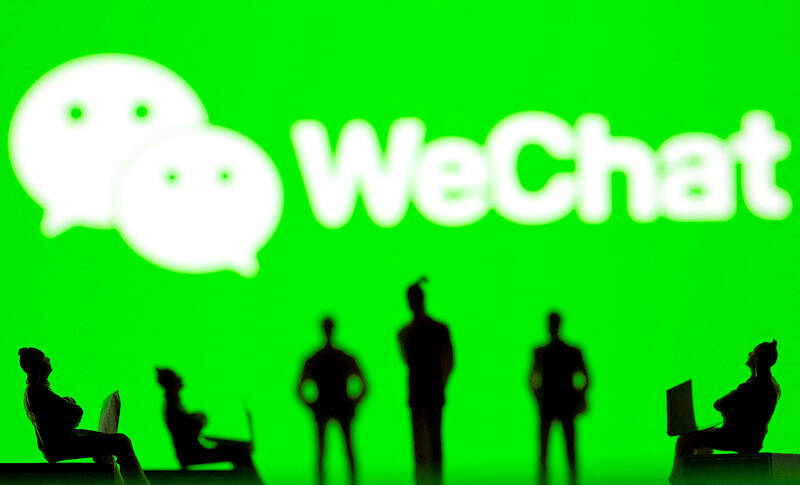Canada on Monday banned popular Chinese messaging app WeChat and Russian platform Kaspersky from government smartphones and other mobile devices, citing privacy and security risks.
The suite of applications would be immediately removed from government-issued devices and users would be blocked from downloading them in the future, it said in a statement.
Treasury Board of Canada President Anita Anand, who oversees the federal public service, said the nation’s chief information officer determined the apps “present an unacceptable level of risk to privacy and security.”

Photo: AFP
No breaches have been detected, but the platforms’ data collection methods on mobile device “provide considerable access to the device’s contents,” she said.
“The decision to remove and block the WeChat and the Kaspersky applications was made to ensure that government of Canada networks and data remain secure and protected and are in line with the approach of our international partners,” Anand said.
Beijing yesterday said that Canada’s decision had been taken “without any actual evidence.”

Photo: Reuters
“The Canadian government has issued a ban targeting Chinese companies under the guise of maintaining data security,” Chinese Ministry of Foreign Affairs spokesman Wang Wenbin (汪文斌) said.
“China firmly opposes this,” he added.
The move comes after Ottawa in February also banned TikTok — a platform owned by ByteDance in China — on government devices.
Relations between Ottawa and Beijing — already strained over tit-for-tat detentions of a Huawei senior executive and two Canadian nationals in December 2018 — hit a new low earlier this year.
Ottawa accused Beijing of meddling in Canadian elections and the attempted intimidation of MPs that led to the expulsion of a Chinese diplomat in May.
Last week, the Canadian government warned of a “spamouflage” disinformation campaign linked to China that used waves of online posts and deepfake videos manipulated to try to disparage and discredit Canadian lawmakers, including Canadian Prime Minister Justin Trudeau.
A public inquiry into foreign interference accusations — which China has rejected — commenced in September.

Thousands gathered across New Zealand yesterday to celebrate the signing of the country’s founding document and some called for an end to government policies that critics say erode the rights promised to the indigenous Maori population. As the sun rose on the dawn service at Waitangi where the Treaty of Waitangi was first signed between the British Crown and Maori chiefs in 1840, some community leaders called on the government to honor promises made 185 years ago. The call was repeated at peaceful rallies that drew several hundred people later in the day. “This government is attacking tangata whenua [indigenous people] on all

A colossal explosion in the sky, unleashing energy hundreds of times greater than the Hiroshima bomb. A blinding flash nearly as bright as the sun. Shockwaves powerful enough to flatten everything for miles. It might sound apocalyptic, but a newly detected asteroid nearly the size of a football field now has a greater than 1 percent chance of colliding with Earth in about eight years. Such an impact has the potential for city-level devastation, depending on where it strikes. Scientists are not panicking yet, but they are watching closely. “At this point, it’s: ‘Let’s pay a lot of attention, let’s

UNDAUNTED: Panama would not renew an agreement to participate in Beijing’s Belt and Road project, its president said, proposing technical-level talks with the US US Secretary of State Marco Rubio on Sunday threatened action against Panama without immediate changes to reduce Chinese influence on the canal, but the country’s leader insisted he was not afraid of a US invasion and offered talks. On his first trip overseas as the top US diplomat, Rubio took a guided tour of the canal, accompanied by its Panamanian administrator as a South Korean-affiliated oil tanker and Marshall Islands-flagged cargo ship passed through the vital link between the Atlantic and Pacific oceans. However, Rubio was said to have had a firmer message in private, telling Panama that US President Donald Trump

The administration of US President Donald Trump has appointed to serve as the top public diplomacy official a former speech writer for Trump with a history of doubts over US foreign policy toward Taiwan and inflammatory comments on women and minorities, at one point saying that "competent white men must be in charge." Darren Beattie has been named the acting undersecretary for public diplomacy and public affairs, a senior US Department of State official said, a role that determines the tone of the US' public messaging in the world. Beattie requires US Senate confirmation to serve on a permanent basis. "Thanks to